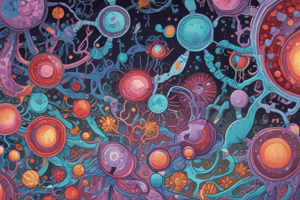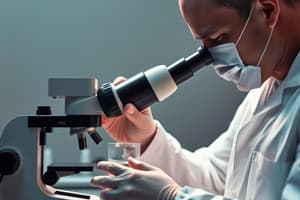Podcast
Questions and Answers
What is the main focus of diagnostic medical microbiology?
What is the main focus of diagnostic medical microbiology?
The etiologic diagnosis of infection.
Which of the following laboratory procedures is NOT mentioned as part of the diagnostic medical microbiology?
Which of the following laboratory procedures is NOT mentioned as part of the diagnostic medical microbiology?
- Antigen testing
- X-ray imaging (correct)
- Morphologic identification
- Culture isolation
Proper labeling of specimens does not require the physician’s contact information.
Proper labeling of specimens does not require the physician’s contact information.
False (B)
Diagnostic microbiology encompasses the detection and characterization of thousands of agents that cause or are associated with __________ diseases.
Diagnostic microbiology encompasses the detection and characterization of thousands of agents that cause or are associated with __________ diseases.
Which testing method is NOT used for the detection of infectious agents?
Which testing method is NOT used for the detection of infectious agents?
What must physicians do before laboratory test results are available?
What must physicians do before laboratory test results are available?
Flashcards are hidden until you start studying
Study Notes
Principles of Diagnostic Medical Microbiology
- Diagnostic medical microbiology focuses on diagnosing infections through various laboratory techniques.
- Techniques for identifying infectious agents include morphologic identification via stains and microscopy (light and electron).
- Pathogen detection methods involve antigen testing (e.g., latex agglutination, enzyme immunoassay) and nucleic acid testing (e.g., PCR, sequencing).
- Culture isolation is crucial for agent identification, including susceptibility testing when necessary.
Importance of Clinical Information
- Clinical context is essential for interpreting microbiology tests, more so than in clinical chemistry or hematology.
- Clinicians should provide tentative diagnoses and appropriate clinical information when requesting laboratory tests.
- Proper specimen labeling must include patient identification, clinical data, and laboratory requestor's contact details.
Specimen Quality and Timing
- The accuracy of laboratory results hinges on specimen quality, collection technique, and transportation.
- Microorganisms may have slow growth rates, often taking days or weeks to culture and identify; timely initiation of treatment is critical.
- Physicians are encouraged to start empirical treatment while awaiting laboratory results, especially targeting suspected infectious agents.
Effective Communication
- Interaction between healthcare providers and laboratory staff is vital for patient management based on evolving diagnostic results.
- Continuous communication aids in re-evaluating diagnoses and adjusting treatment plans as necessary.
Studying That Suits You
Use AI to generate personalized quizzes and flashcards to suit your learning preferences.



